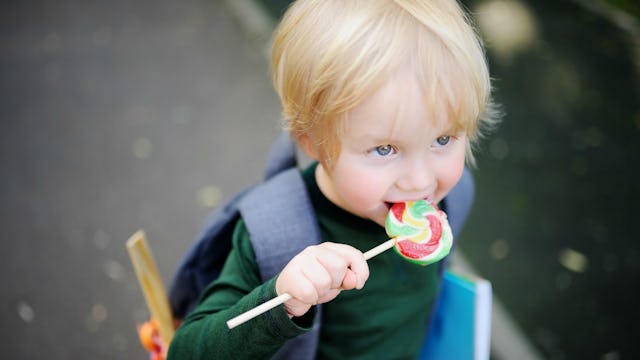Let's Stop With The Food Rewards, And Here's Why

It’s a simple principle of behavioral psychology – reinforce behaviors you want, discourage behaviors you don’t want. Reward. Punish.
In school, reward and punishment are used frequently to teach good study habits and to motivate learning. For a child with diabetes, or for any child with food allergies or dietary restrictions, however, rewards based on food can have the opposite effect. In fact, food rewards can seem like punishment when one is unable to eat them.
Two weeks before my son started third grade, he was diagnosed with Type 1 diabetes, formerly known as juvenile diabetes. Since that time, he and I have struggled with food rewards in school, especially that first year after his diagnosis when he had a teacher who frequently used candy and class parties to reward students for good behavior and good grades.
Type 1 diabetics can eat anything as long as they dose insulin to cover the carbs contained in the food or drink. But candy, for most people living with Type 1, is medicine; it is used to raise blood glucose levels quickly when they experience hypoglycemia. So for a child living with diabetes, candy rewards may not motivate or make the child feel proud at all.
Last night, while doing the obligatory weekly backpack clean out, I found a bag of M&Ms, flattened into a chocolate mess. I assumed they had been in his backpack for weeks, but, on the contrary, they were from that very day according to my son. He had apparently squashed them because he didn’t intend to eat them and they were “useless pieces of crap he didn’t want”–sorry, his words, not mine.
I was horrified, on the one hand, that my son harbored such anger and violent feelings about the candy, but I was equally horrified that his teacher could have so little regard or respect for the constraints imposed by his disease.
It is difficult enough for a child to adjust to having diabetes; even though the disease may be invisible to others, it is very visible to that child and it can make them feel different. Every time my son’s teacher gives out candy, and he quietly puts it in a ziplock bag to take home while the other kids enjoy the treat in the moment, he feels that difference ten-fold. It’s been tough for him.
As a teacher, myself, I know it is important to reinforce good behaviors in the classroom and at home, but we all should understand that such reinforcement could undermine our efforts if the reward fails to match the individual. And really, do the kids need all that candy? Probably not. So here’s my top ten list of non-food rewards for the classroom and beyond.
1. Free Homework Pass. Ah…who doesn’t want a day off from homework? This is great for younger and older students.
2. Extra Recess Pass. For the younger kids! Arrange the extra time with another class and reciprocate for that teacher’s students! Or use as a whole class reward when the entire class meets a goal, such as meeting a reading goal or passing a test.
3. Classroom Helper for a Day. All ages can help by passing out class materials, giving instructions for assignments, etc. Ask the student what she/he would like to do to help out.
4. Spirit Day. If the entire class meets a goal, host a spirit day for the class–funky socks day, silly hat day, dress as your favorite book character day…the kids will come up with a lot of creative and fun ideas.
5. Free iPad/Game Time Pass. Allow the pass holder to use the classroom iPad during down time.
6. Movie Time. If the entire class meets a goal, reward the students with a movie one day. Let them vote on the movie selection.
7. Local attraction coupons. Ask local businesses to donate free passes or discount coupons. Great ideas include bowling, skating, miniature golf, batting cages, and more.
8. Funky school supplies. Keep a stash of fun erasers, pens, and other items kids of all ages might enjoy–after holiday sales are a great time to stock up. Some companies also have great deals when you buy in bulk. Keep a treasure chest in class for those reward occasions.
9. Auction Day tickets. One of my son’s teachers hosted an auction at the end of every grading period. Throughout the period, students would receive tickets for good grades and good behaviors. At auction time, the teacher asked parents to donate items and the kids used their tickets to bid on items. Hands-down, this has been the most successful rewards program my son has experienced. He loved it! It also teaches students about consumerism and economic value.
10. Water/Snow Day. In warmer climates or toward the end of spring, host a water fun day if the entire class meets a goal. Pick up water shooters for a $1 each at the dollar store, as well as some water balloons. Hook up a sprinkler and let the kids have fun! On snowy winter days, allow the kids to have recess or play time in the snow. Have a snow sculpture contest–even the older kids will love this!
This article was originally published on